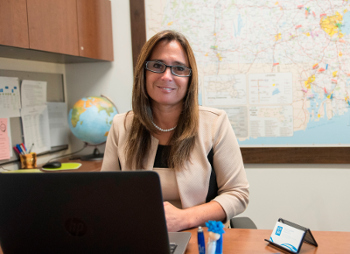Do you have a question about JRI services?

Many folks consider becoming a foster parent, but often aren’t sure if they are eligible or what will be involved. Are you one of the wondering? Well, read on for the answers to your questions!
- Call or e-mail the Homefinder
The first step is simply reaching out. Some people are phone people, some are e-mail people. Either is fine, but nothing can happen until you do one or the other. Our online interest form can be found here: http://jri.org/contact/foster_care_contact_form
- Assess Basic Eligibility Criteria
Are you 21 or over? Do you have three children under 18 or fewer living in your home? Do you have your own source of income that meets your household’s current needs? What is your daily schedule like? Do you have a spare bedroom (room with a door, window, furnishings) for a child? Our agency is one of the most cautious, so we do not permit room shares. We know this means fewer placements in some cases, but safety is more important to us than maximum numbers. Do you have dogs from the banned breed list (Rottweilers, Pit bulls, or German Shepherds)? Do you have firearms in your home? If so, how are they kept? Yep, it is pretty basic.
- Application and CORI Forms
We send you an application and CORI (Massachusetts state criminal background check) form. The CORI must be completed by every household member age 15 and older. You complete the forms and mail them back to us (or fax, scan/e-mail, hand deliver, passenger pigeon, pony express, etc). We enter the info into the state’s computer system and run the CORI. We all wait until the results are returned to our agency.
- Assessing CORI Results
CORIs turn up ALL criminal charges (not just convictions), allegations of child abuse/neglect, and sex offender registry information. If there is a CORI issue or a child welfare history, we will call you to discuss it and assess if that is a stopping point in this process or if we can move forward. There are some charges that are prohibitive, but others just require obtaining proper documentation and writing statements to explain the incident (ex. Getting pulled over for speeding, forgetting to pay the ticket, and having a violation due to that). We submit that to the Department of Children and Families (DCF) central office, they review the charge, and approve if it is appropriate. We call you with the happy news!
- Home Inspection
Once the CORI is back and all approved, we schedule an appointment to come to your home and do an inspection. We look at your home more intricately to ensure you have working smoke detectors, carbon monoxide detectors, a fire extinguisher in the kitchen area, the home is clean and does not appear to pose a hazard, cleaning products are locked up in a safe place, medications are locked up in a safe place, the home is in good repair (has railings on stairways, no broken windows, etc). We measure the bedroom you intend to use for a child. It must be a minimum of 50 square feet (a 5 foot by 10 foot room, essentially). We discuss fire safety plans, escape routes in case of emergency, check your furnace for a recent inspection (within one year), and chimneys for recent inspections and cleanings (within one year). We turn on your hot water, your stove burners, and open your refrigerator. If you keep alcohol in your home, we want to know where you keep it and how you would monitor it if a child were in your home. Sounds complicated, but it is pretty quick and easy. If there are issues, we discuss them and talk about how to address each issue.
- MAPP Class
Once you’ve had a successful home inspection and meet basic criteria, we invite you to MAPP class. This is the “Massachusetts Approach to Partnerships in Parenting” and it is a 30 hour course required of all foster and pre-adoptive families. All caretakers in the home must attend the entire course. Our agency generally holds the course over a few weekends. While it is a lengthy commitment, so is caring for a vulnerable human being! The course is essentially Foster Care 101. You will learn about the various agencies and systems that play a role in child welfare, the reasons children enter care, families who are involved in child welfare, expectations of foster parents, common challenges in foster parenting, and the importance of working with biological families, foster families, adoptive families, and professional supports. You won’t learn everything about this adventure, but it will give you a nice foundation.
- Home Study
Your amazing Home Finder will come out to your house. He/She will meet with every household member to talk about who they are, what they think about being a foster/adoptive family, and any concerns therein. The caretakers will meet most extensively with the Home Finder. They will essentially provide an autobiography to the Home Finder so that the Home Finder can get to know them as clearly and specifically as possible. Why is this important? Because when we match families with children, the more we know means the better we can do our jobs, and the greater the likelihood that a match will be appropriate and successful.
- References and Fingerprints
While the Home Study is going on, the Home Finder will obtain four personal references, medical references for all household members, educational references for any household children in grade school, and employer references. Applicants will also provide birth certificates, marriage and divorce certificates (as needed), gun permits and registrations (as needed), dog licenses and vaccination records (as needed), CPR and First Aid certificates for caregivers, and any other documentation necessary for a household’s unique circumstances. All household members 15 years of age and older will also be sent for fingerprints. This assesses criminal records throughout the United States, not just Massachusetts. This is free of charge and is arranged at your convenience.
- Approval
Your Home Finder will write up a final Home Study Assessment, which is a comprehensive report documenting each household’s unique history, motivations, personal experiences, strengths, and areas of interest. This is submitted to our agency’s supervisory staff for approval, as well as to DCF’s central office. Once all parties feel the report is satisfactory, the home is licensed!
- Placement
Licensed homes begin working with the staff to review the files of children looking for homes. Staff will usually identify a few potential matches and go through the information with each household (just the caregivers). Every piece of information that is know is presented so that the household can make a proper assessment of the child. Households are encouraged to say no if they do not feel ready to take a placement or feel the match is not for them. We would rather bide our time than make an inappropriate match. It is a leap of faith, but we are here to walk with you once you say yes. And with that simple word, “yes,” your foster care journey begins.
Ten steps can change your life. They can also change someone else’s. If you’ve been considering foster or pre-adoptive care, please contact us when you are ready for that very first step.



